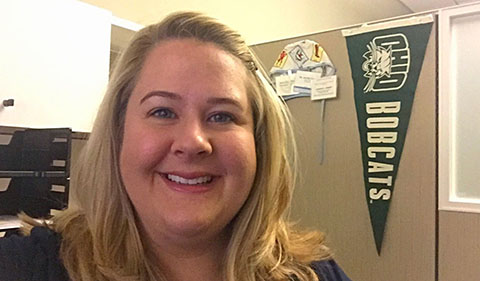
Jen Winner
Jennifer Winner ’04 is a medicolegal death investigator.
After graduating from the College of Arts and Sciences at Ohio University with her B.A. in Anthropology, Winner started in the forensics field in 2005 as an autopsy assistant in Washington D.C. at the Office of the Chief Medical Examiner.
After almost two years, she accepted a position in Richmond, VA, as a medicolegal death investigator at the Office of the Chief Medical Examiner.
While in Richmond, she obtained her American Board of Medicolegal Death Investigator board registry certification.
A little over seven years later, she accepted a position in Detroit as a medical investigator at the Wayne County Office of the Chief Medical Examiner.
Then just recently she accepted a position as a Medical Examiner Specialist at the Office of the Chief Medical Examiner in Raleigh, NC. Her new position mainly consists of performing duties as a medicolegal death investigator.
“As a medicolegal death investigator, it is my responsibility to take death notifications from hospitals, police and even funeral homes and determine whether or not they fall under the jurisdiction of the medical examiner,” she says.
“The medical examiner’s jurisdiction includes all deaths that are unnatural, suspicious, violent and unexpected (some examples are homicides, suicides, accidents, trauma related, and disaster related). During death notifications, I ask a series of questions, all case-specific, to determine if the medical examiner needs to be involved in the investigation to determine the cause and manner of death.” This could also involve responding to death scenes, she adds.
“While on a death scene, my main responsibility is to take jurisdiction of the body and document the scene with both a report and photos. My training as a medicolegal death investigator has incorporated an understanding of law and medicine, which is beneficial to knowing what the medical examiner wants to know on a case-by-case situation. As a medicolegal death investigator, I also have experience with evidence collection, identification of remains and speaking with next of kin.
“Courses I took at Ohio University helped guide me towards what I am doing now,” Winner says. “When I started freshman year, I had no idea what I wanted to do. I threw around the idea of international business, criminology and criminal justice.
“While I was finishing up my basic requirements, I was enrolled in a Biological Anthropology course with Dr. Nancy Tatarek. By the time the course was over, I was ready to declare Anthropology as my major, with a focus on biological and archaeological anthropology,” Winner says.
“Dr. Tatarek was one of the best professors I have ever had, and her enthusiasm for the subject matter rubbed off on to me. I started taking independent study courses with her focusing on human osteology and forensic anthropology. She encouraged and assisted me in getting accepted to a study abroad program in London for forensic anthropology.
“The study abroad program changed my life! It sparked an interest in forensics and the identification of unknown remains,” Winner says.
“I love everything about what I do! I get the most satisfaction when I have successfully investigated a case. By successfully, I mean that the person has been identified, the cause and manner of death have been determined, and not only does the medial examiner have answers about someone’s death, but so does the family.
“I absolutely love the process of the investigation,” she says. “Starting from the beginning with no answers and having no idea where it might lead and from there knowing the questions to ask to find out what happened, putting the puzzle together.”
She says she also wants to be there for the families of the decedents.
” I want to make this terrible time easier for them and give them one less thing to have to worry about, by doing my job right and making the process streamline better.
“And most of all I like the identification of unknown remains, it is my true passion.”


















Comments